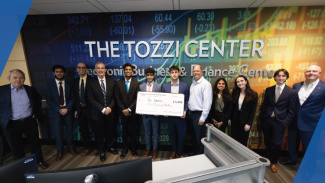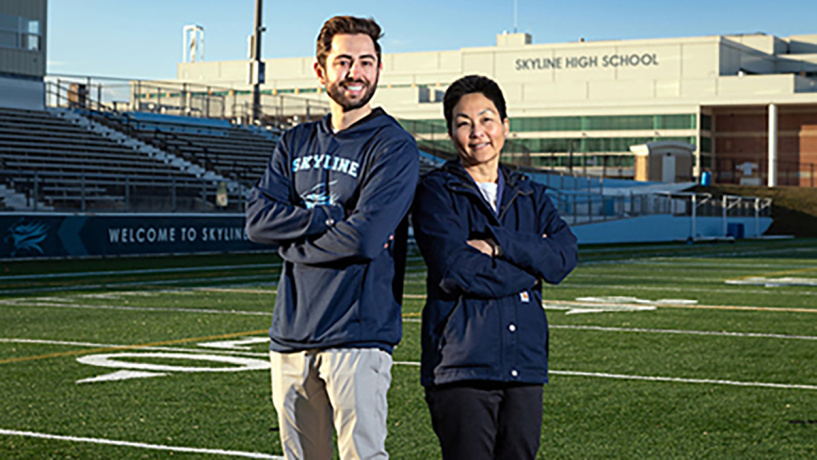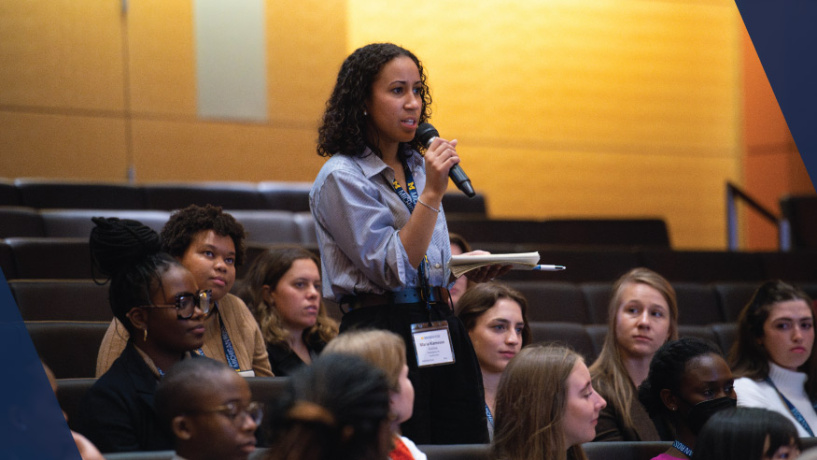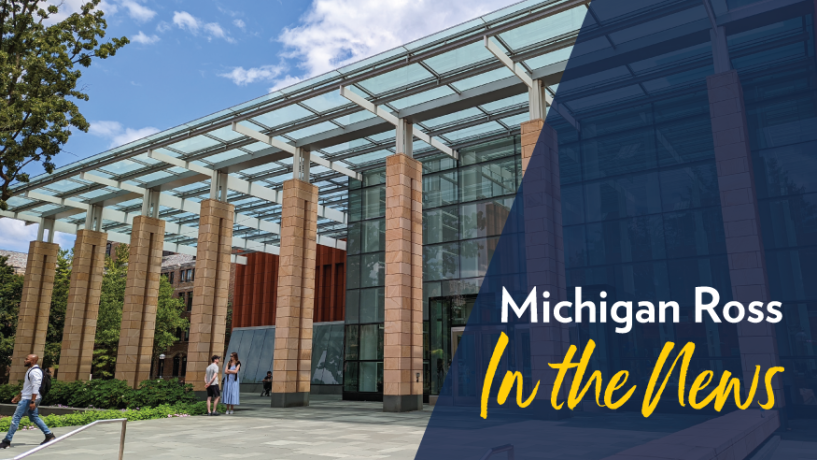Michigan Ross Students Pitch Investments to Professionals at the Maize and Blue Stock Pitch Competition

On Feb. 9, the Maize and Blue Endowment Fund at the Ross School of Business hosted its second-ever stock pitch competition.
The Maize and Blue Stock Pitch Competition was founded in 2023 by Jordan Hymowitz, LSA ’90, Corey Tobin, BBA ’95, and Pedram Nezafat, Michigan Ross lecturer and faculty advisor to the Maize and Blue Endowment Fund. The competition’s goal is to provide a forum for students to showcase their stock-pitch skills to a panel of investors, with opportunities to gain mentorship, network with firms, and win prizes.
This year, students from Michigan Ross, the College of Literature, Science, and the Arts, and Michigan Engineering worked closely with professional investors to fine-tune stock-pitch presentations that they then shared with a panel of judges during the final competition on Feb. 9. Competitors also had the opportunity to attend dinner with investors and attend a University of Michigan vs. Michigan State University hockey game as a group.
Thrivent, William Blair & Co., Philadelphia Financial Management, and BlackRock Inc. sponsored the event, which is open to all U-M students.
This year’s investor panel included Matthew Finn, head of equity investments at Thrivent; Jordan Hymowitz, managing principal/portfolio manager at Philadelphia Financial; Matthew Lipton, portfolio manager at Wellington Management; Phil Ruvinsky, head of the U.S. growth team at BlackRock Inc.; and Corey Tobin, partner/investment management analyst at William Blair & Co.
"I am very pleased with the outcome of this year's Maize and Blue Stock Pitch Competition. It was great to give our students the chance to network with accomplished alumni investors who could help students with their investment analysis skills as well as offer advice on their goals going forward," said Nezafat. "I am very proud of the work our students were able to create and present this year. The students' professionalism and preparedness were a testament to their hard work and dedication to their studies."
The competition’s winner was Jayant Namdhari, BBA ’26, who took home $5,000 for his investment thesis on the company Hims & Hers Health, Inc.
To learn more about the Stock Pitch Competition, we asked Namdhari to share his experience as a competitor this year.
 Jayant Namdhari, BBA ’26
Jayant Namdhari, BBA ’26
Hometown
Dallas, TX
What are your future/post-grad career goals?
I'm going to be working next summer at Accel-KKR, a technology-focused private equity firm, and in the summer of 2025 at Weiss Asset Management, a hedge fund. As far as long-term career goals go, I'm still very uncertain because, honestly, I never thought investing was where I'd end up. I actually got very lucky to be introduced to the career through great mentors that I’ve had and ended up finding it to be very interesting.
Over the long term, I'm not entirely certain, but I would like to potentially go into journalism or teach high school debate if I were ever to make a career switch. If I were to stay in finance, I'd probably want to start my own fund someday.
What kind of work/research went into preparing your pitch presentation?
I think that the research process generally varies a lot by company and industry, but a few things are constant. First, just researching/ramping up about the company and industry I'd try to read as much as possible, so 10-K's, investor presentations, earnings calls, any podcasts that involve the company, etc. During that process, I'd also build out a basic financial model for the company, identifying the most important metrics (key performance indicators) that drive the company's performance.
The goal with both of these things is really just to understand the company and industry very well and understand the factors to consider that could affect it. However, I think it's important to note that good companies aren't necessarily good investments, and bad companies aren't necessarily bad investments. Thus, the next step is to go beyond understanding the company and now understand the stock. This is a lot more difficult, but generally, what I’d look for is to understand how the stock trades, what moves the price up, what moves the price down, of all the KPIs modeled earlier, which ones investors are really focusing on, what is the 'key debate' surrounding the investment. As college students, we have limited access to understanding price action, but I think that having access to earnings call transcripts and really hearing the questions of other investors that we might be competing against are asking is really helpful.
Lastly, after identifying the key debate surrounding the company, the next step is to figure out what the correct side of that debate is and make a bet accordingly. This is my favorite part of the process and often the most difficult and unstructured. It would involve really understanding something about the business better than other people. This can result in unique research rabbit holes and deep research ranging from using various alternative data points, calling Michigan Alumni who are experts in the industry, and really building a mosaic of information that can be used to find the true north surrounding the key debate.
The company I pitched was a short on Hims and Hers Health Inc. (NYSE: HIMS), and I found that the key debate, as explained to me by a U-M alum who is currently an equity research analyst on Wall Street, was really surrounding expectations as to what the business's profitability would look like going forward as it had recently transformed from a cash-burning, high-growth business to slowing growth levers and becoming more profitable.
The main drivers of profitability for HIMS were its ability to scale back marketing expenses (because their subscription healthcare model implies users will be retained over a long period of time), selling one customer on multiple medications, and pricing their medications at a premium.
To conduct my due diligence on all of these points, I had to do some unconventional research:
Looking at historical medication pricing and comparing to costs of buying medication online via competitors revealed high prices were unsustainable, and via looking at older versions of the company’s website, the monthly cost they charge for their medicines was declining in suit.
Talking to experts in the industry revealed that the majority of HIMS’ erectile dysfunction users weren’t old people who had ED but rather younger, college-age kids who used ED medication recreationally which was further corroborated via web traffic analyses. Additionally, medical studies revealed significantly lower retention rates for the underlying medication than what HIMS was advertising to investors.
Lastly, looking at legal documents and medical malpractice rules indicated that while HIMS’ touts cross-sell, their main medications (ED and hair loss) are medically contraindicated. Because ED medication causes hair loss and hair loss medication causes ED, prescribing both to one person can result in malpractice charges and is not permitted.
This led to the conclusion that the consensus view of the business was overly optimistic.
What was your experience competing in the stock competition?
It was a great experience! I was recruiting for jobs for the summer of 2025 at the time concurrently, so I was extremely busy at the time balancing interviews, networking calls, classwork, and prepping for the competition at once. However, I think it gave me more clarity in terms of what I wanted to do — working on the pitch, making slides, and refining the model were all really enjoyable. It didn’t really feel like work and I was having a lot of fun, which helped me realize I'd love a public markets/hedge fund role much more than investment banking, private equity, etc.
Aside from the workload, it was really great; Professor Nezafat and all the sponsors worked extremely hard to set everything up seamlessly. We had the opportunity to speak with so many investment professionals — I was seated with two growth team members at BlackBock for dinner and learned so much from them that helped with the presentation the next day.
I don't think it was intense or competitive at all; everyone was super friendly, and we actually looked at each other's decks and gave feedback before the day of the competition. The most interesting thing was adapting to only having eight minutes to present; it really helped teach the importance of being concise and focusing on what's most important.
How did the things you've learned at Ross so far help you in this competition?
It's helped tremendously. The clubs at Ross gave direct experience in the work involved in the pitch process. I'm part of Michigan Interactive Investments, an investment club on campus that's really taught me most (if not everything) that was useful for the competition. I think that MII alone has taught me more than any course I've taken or book I've read thus far. Beyond the learning, having a community of people who are equally interested in investing to bounce ideas off of, receive constructive feedback from, and also just serve the role of being best friends as well as mentors has been one of the most rewarding experiences of college. I highly recommend that anyone at U-M who's interested in investing apply!







